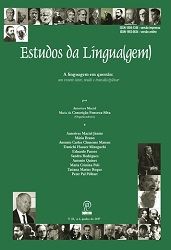Blanchot, the literaty experience and the end of history: open doors of a generation
DOI:
https://doi.org/10.22481/estudosdalinguagem.v15i1.2399Keywords:
Subjectivit. Devices. Literary experience.Abstract
This article starts from the famous diagnostic of the end of history - thesis defended by Francis Fukuyama just after the fall of the Berlin Wall. Inspired by authors as Michel Foucault, Gilles Deleuze and Giorgio Agamben base their work on a perspective which holds that the machinery of capital - much more than an economic system - is the producer of subjectivity: in plots of knowing and power operated by devices, it duplicates lives in order to create ways of existence in a way more and more precise and in an everyday basis. What is insinuated in the idea then is the thesis of Walter Benjamin: capitalism as religion - manufacturing existences uninterruptedly starting from the unceasing dissemination of devices. In the presenta generation that works for the end of history would be announced - the one that would live making happen what in one occasion Italo Calvino called hell. From this diagnosis, -following Maurice Blanchot and Roberto Bolaño, the bet is that what is operated under literary experience can weaken the plot devices already ready from a supposed end of history - and this politic task would be in charge of making flourish the power of art: to enforce the unending of the world, therefore, the impossibility of the end of history.
Downloads
References
BENJAMIN, Walter. O capitalismo como religião. São Paulo: Boitempo, 2013.
BLANCHOT, Maurice. A fala cotidiana. Em: A conversa infinita 2: a experiência limite. São Paulo: Escuta, 2007.
_____. O livro por vir. São Paulo: Martins Fontes, 2005.
BOLAÑO, Roberto. Os detetives selvagens. São Paulo: Companhia das Letras, 2006.
DELEUZE, Gilles. Conversações. Rio de Janeiro: Ed. 34, 1992.
FOUCAULT, Michel. História da loucura na Idade Clássica. São Paulo: Editora. Perspectiva, 1978. Edição original: 1961.
_____. O Nascimento da Clínica. Rio de Janeiro: Forense Universitária, 1977. Edição original: 1963.
_____. As Palavras e as Coisas. Uma arqueologia das ciências humanas. Martins Fontes. São Paulo, 2000. Edição original: 1966.
_____. A arqueologia do saber. Rio de Janeiro: Forense Universitária, 1972. Edição original: 1969.
_____. Vigiar e punir: nascimento da prisão. Petrópolis: Vozes, 1987. Edição original: 1975
_____. A história da sexualidade I: a vontade de saber. Rio de Janeiro: Edições Graal, 1988. Edição original: 1975.
GAGNEBIN, Jean-Marie. Entre a vida e a morte. In: OTTE, Georg; SEDLMAYER, Sabrina; CORNELSEN, Elcio (Org). Limiares e passagens em Walter Benjamin. Belo Horizonte: Editora UFMG, 2010.
Downloads
Published
How to Cite
Issue
Section
License

Estudos da Língua(gem) is licensed under a Creative Commons Attribution 4.0 International License.
Authors who publish in the journal Estudos da Língua (gem) agree with the following terms:
The journal Estudos de Língua(gem) maintains the copyrights of the contributions published. These rights include the publication of the contribution and make its content available for free through the portal.







